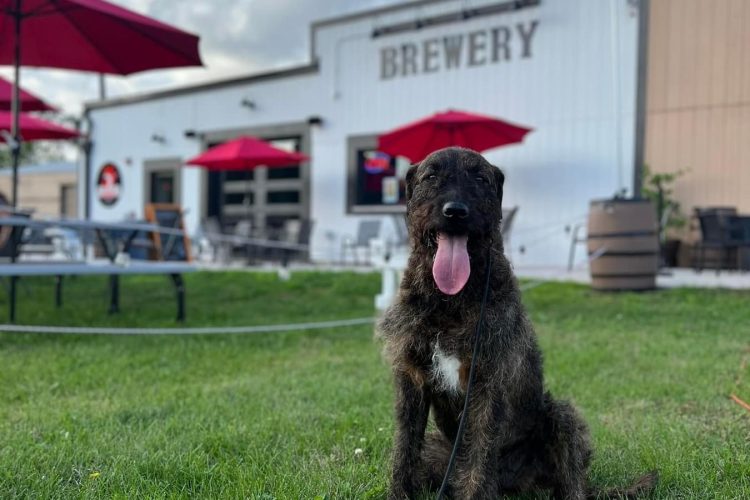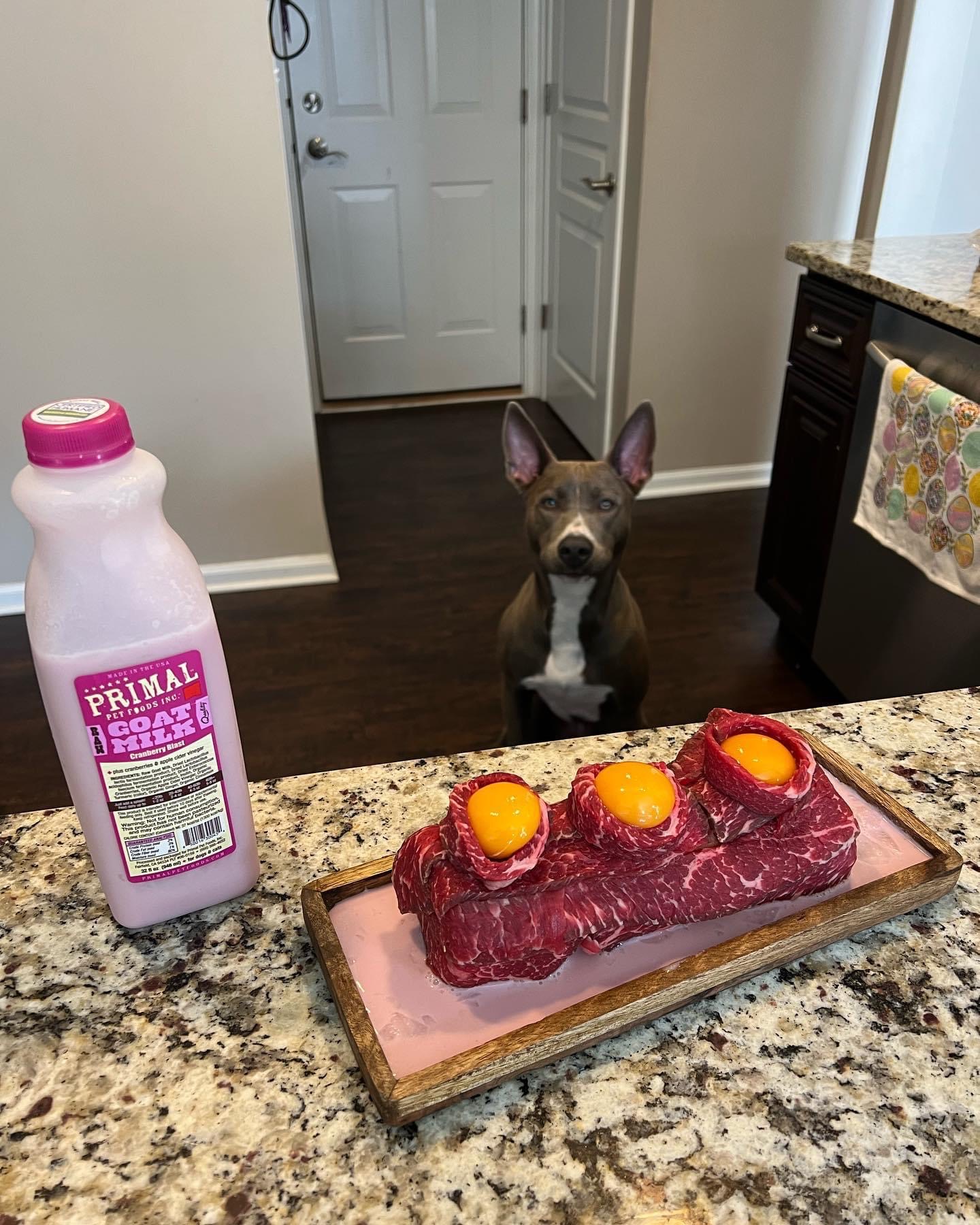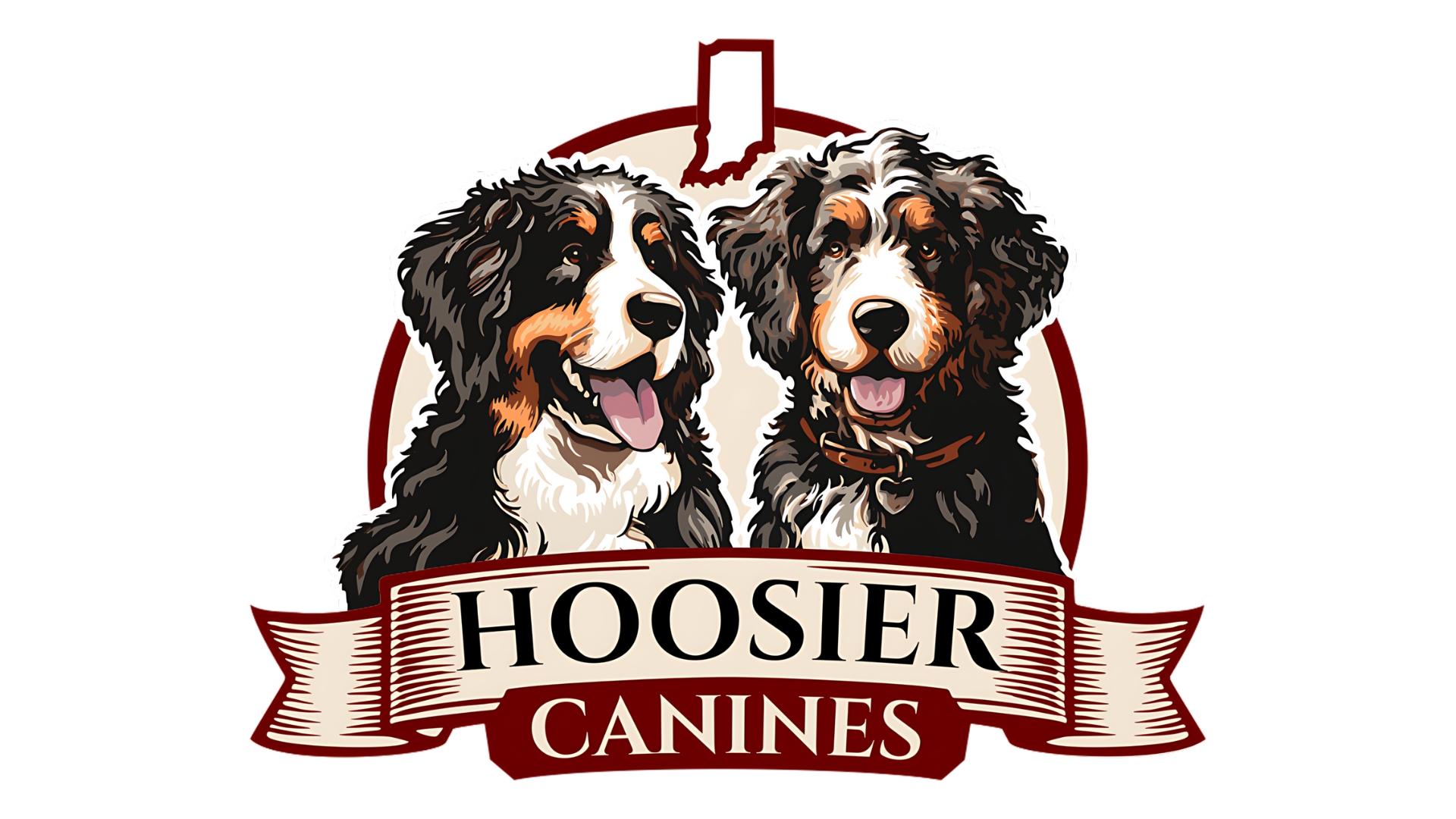Looking to Boost Your Dog’s Health? It Starts with the Gut!
If you’re here, chances are you want to help your dog feel their best—and what better way to do that than by starting from the inside out? Just like us humans, our dogs’ health depends on more than just exercise and the occasional treat. Their gut plays a massive role in everything from digestion to immune function, and even their mood!
Whether your pup’s been dealing with tummy troubles, low energy, or you just want to be proactive in keeping them healthy, you’re in the right place. The good news is that supporting your dog’s gut health isn’t complicated, and a few simple tweaks—like adding probiotics and gut-friendly foods—can make a world of difference.
In this blog, we’ll dive into some of the best probiotic foods for dogs, why raw goat’s milk is an absolute game-changer, and how you can easily introduce these gut-boosting ingredients into your dog’s diet. So, let’s get started and make your furry friend healthier from the inside out!
Why is Raw Goat’s Milk Good for Dogs?
- Rich in Probiotics: Raw goat’s milk is loaded with naturally occurring probiotics that help balance your dog’s gut flora. A healthy gut microbiome enhances digestion, boosts immunity, and can even improve mood and behavior.
- Easily Digestible: The molecular structure of goat’s milk makes it easier to digest than cow’s milk. It has smaller fat molecules and contains less lactose, which reduces the chance of causing digestive issues like bloating or diarrhea.
- Nutrient-Dense: Goat’s milk is rich in essential fatty acids, vitamins (especially A, B, and D), and minerals like calcium and magnesium. These nutrients promote overall health while nurturing your dog’s gut microbiome.
- Supports Inflammation Reduction: The anti-inflammatory properties of raw goat’s milk help soothe digestive issues and can even alleviate symptoms of allergies or skin conditions that are often tied to poor gut health.
- Immune Boosting: Goat’s milk contains oligosaccharides, which have prebiotic effects. These prebiotics feed the good bacteria in the gut, further enhancing the immune response.




How to Introduce Raw Goat’s Milk to Your Dog’s Diet
Introducing raw goat’s milk into your dog’s diet is simple, but you want to do it gradually to avoid overwhelming their digestive system.
- Start Slow: Begin by offering a small amount of raw goat’s milk, like a tablespoon, mixed in with their regular food. Observe how your dog reacts, especially for any signs of upset stomach or diarrhea.
- Gradual Increase: After a few days, if your dog handles the milk well, you can gradually increase the serving size to about 1 ounce per 10 pounds of body weight per day.
- Serve It Fresh: Raw goat’s milk should be fresh, not pasteurized, to retain the active probiotics and enzymes. You can find it at specialty pet stores, local farms, or even online from trusted sources.
- Consistency: To maximize the benefits, you can serve goat’s milk regularly, but it doesn’t need to be daily. A few times a week should be sufficient to provide a good probiotic boost.
Other Foods That Support Gut Health
In addition to raw goat’s milk, there are other foods that can significantly help maintain a healthy gut for your dog:
1. Fermented Vegetables
Fermented veggies, like sauerkraut or fermented carrots, are rich in probiotics. They can improve digestion and support the immune system. However, be sure to use vegetables that are fermented naturally without any added salt or seasonings harmful to dogs.
How to introduce: Start with a small teaspoon mixed into their meal and increase gradually as their system adjusts.
2. Bone Broth
Bone broth is soothing for the gut and packed with collagen, gelatin, and amino acids that support digestive lining integrity. It can be especially helpful for dogs with leaky gut or digestive issues.
How to introduce: You can pour a bit of bone broth over your dog’s food or serve it as a hydrating treat on its own.
3. Pumpkin
Pumpkin is a fantastic source of dietary fiber that acts as a prebiotic, helping to feed good bacteria in the gut. It also helps regulate bowel movements, whether your dog is dealing with constipation or diarrhea.
How to introduce: Start with a tablespoon of plain, unsweetened pumpkin puree (not the spiced pie filling) mixed with their food.
4. Kefir
Kefir, a fermented milk drink similar to yogurt, is another excellent source of probiotics. It contains a broader spectrum of probiotics than yogurt, making it highly effective for boosting gut health.
How to introduce: Add a small amount of plain, unflavored kefir to your dog’s meal (about a tablespoon for smaller dogs and up to ¼ cup for larger dogs).
5. Probiotic Supplements
If you’re looking for something more concentrated, high-quality probiotic supplements for dogs can be a great option. Look for products that contain multiple strains of beneficial bacteria like Lactobacillus and Bifidobacterium, which are commonly found in a dog’s natural gut flora.
How to introduce: Follow the dosage recommendations on the product label, and consult with your vet if you’re unsure.
6. Yogurt
Plain, unsweetened yogurt is an easy, dog-friendly source of probiotics. However, because some dogs are sensitive to dairy, you’ll want to observe how they react before making it a regular part of their diet.
How to introduce: Start with a small spoonful added to their meal. Make sure to use plain yogurt without any added sugar or artificial sweeteners like xylitol, which is toxic to dogs.
7. Raw Green Tripe
Green tripe is the untreated stomach lining of grazing animals like cows or sheep and is naturally rich in probiotics and digestive enzymes. Its pre-digested plant matter makes it incredibly beneficial for your dog’s gut health and can significantly improve digestion.
How to introduce: You can find raw green tripe at specialty pet food stores. Start with a small amount (1 tablespoon for small dogs and ¼ cup for larger dogs), mixed with their regular food.
Gut Health Benefits of a Probiotic-Rich Diet
- Better Digestion: Probiotics help break down food more efficiently, preventing gas, bloating, and constipation.
- Boosted Immunity: Since a significant portion of the immune system is located in the gut, maintaining a healthy gut helps fend off infections and illnesses.
- Improved Mood and Behavior: A healthy gut can reduce anxiety and stress in dogs, leading to better behavior and an overall happier dog.
- Healthier Coat and Skin: By improving digestion and nutrient absorption, probiotics contribute to a shinier coat and healthier skin.
Some "Final Thoughts"
Raw goat’s milk is an excellent, natural source of probiotics that can help maintain and improve your dog’s gut health. Along with other probiotic-rich foods like fermented veggies, kefir, and pumpkin, it can support a healthy digestive system, boost immunity, and lead to an overall healthier, happier dog. As always, introduce new foods gradually, monitor your dog’s response, and consult your vet to ensure a balanced and gut-friendly diet.
Want More Content Like This? Share This Post!
By sharing Training That Lasts, you’re not just promoting our dog training – you’re promoting happier homes, stronger friendships, and a richer understanding between humans and their canine companions. Help us Redefine Relationships one best friend at a time!
Table of Contents
Lets Work Together!
Our Consultation Assessment form is the perfect starting point for us to help you and your pet. We understand how difficult it can be to manage your dog’s behavior, especially if you’re away on vacation or busy with work. Our team of experienced trainers will evaluate your dog’s needs and develop an individualized training plan to get them back on the right track. With our assistance, you can rest assured that your pet will receive the best care possible.
Learn More From Training That Lasts

Key Functions of a Healthy Gut Microbiome:
- Digestion and Nutrient Absorption: The gut microbiome plays a crucial role in breaking down food and facilitating nutrient absorption. Research in the Journal of Animal Science (2018) showed that beneficial gut bacteria produce short-chain fatty acids, which are vital for colon health and energy metabolism.
- Immune System Regulation: A significant portion of a dog’s immune system resides in the gut. A study in Frontiers in Immunology (2020) demonstrated that a balanced gut microbiome helps modulate immune responses, potentially reducing the risk of allergies and autoimmune disorders.
- Mental Health and Behavior: The gut-brain axis in dogs is an area of growing research interest. A review in Animal Microbiome (2021) highlighted how gut bacteria can influence neurotransmitter production, potentially affecting mood and behavior in dogs.
- Pathogen Defense: A healthy gut microbiome acts as a barrier against harmful pathogens. Research published in Veterinary Microbiology (2017) showed that beneficial gut bacteria compete with pathogens for resources, effectively reducing the risk of infections.
Disclaimer: The information provided in this blog is for educational and informational purposes only and is not intended as a substitute for professional veterinary advice, diagnosis, or treatment. Always consult with your veterinarian or a qualified pet nutritionist before making any significant changes to your dog’s diet or health regimen. The use of probiotics, raw food, or any dietary changes should be introduced with care, and every dog’s health and needs are unique. Training That Lasts is not responsible for any adverse effects resulting from following the information presented in this blog.




